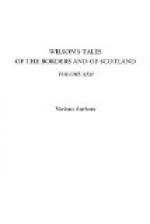LAST WILL AND TESTAMENT
BY
DAVID GRIERSON,
IN FAVOUR OF
RACHEL GRIERSON,
1776
LADY RAE.
During the time that Oliver Cromwell was in Edinburgh, a lady called one day at his lodgings and solicited an interview. She was closely wrapped up in a large and loose mantle, and deeply veiled. The former, however, did not conceal a shape of singular elegance, nor mar the light and graceful carriage of the wearer. Both were exceedingly striking; and if the veil performed its duty more effectually than the mantle, by completely hiding the countenance of the future Protector’s fair visitor, it was only to incite the imagination to invest that countenance with the utmost beauty of which the “human face divine” is susceptible. Nor would such creation of the fancy have surpassed the truth, for the veiled one was indeed “fair to look upon.”
On its being announced to Cromwell that a lady desired an interview with him, he, in some surprise, demanded who and what she was. The servant could not tell. She had declined to give her name, or to say what was the purpose of her visit.
The Protector thought for a moment, and as he did so, kept gazing, with a look of abstraction, in the face of his valet. At length—
“Admit her, Porson, admit her,” he said. “The Lord sends his own messengers in his own way; and if we deny them, He will deny us.”
Porson, who was one of Cromwell’s most pious soldiers—for he served in the double capacity of warrior and valet—stroked his sleek hair down over his solemn brow, and uttered a sonorous “amen” to the unconnected and unintelligible observation of his master, who, it is well known, dealt much in this extraordinary sort of jargon.
Having uttered his lugubrious amen, Porson withdrew, and in a few minutes returned, conducting the lady, of whom we have spoken, into the presence of Cromwell.
On entering the apartment, the former threw aside her veil, and discovered a countenance of such cunning charms as moved the future Protector to throw into his manner an air of unwonted gallantry.
At the lady’s first entrance he was busy writing, and had merely thrown down his pen when she appeared, without intending to carry his courtesy any further; but he had no sooner caught a sight of the fair face of his visitor, than, excited by an involuntary impulse, he rose from his chair and advanced towards her, smiling and bowing most graciously; the latter, however, being by no means remarkable either for its ease or its elegance.
“Pray, madam,” now said Cromwell, still looking the agreeable—so far as his saturnine features would admit of such expression—“to what happy circumstance am I indebted for the honour of this visit?”




